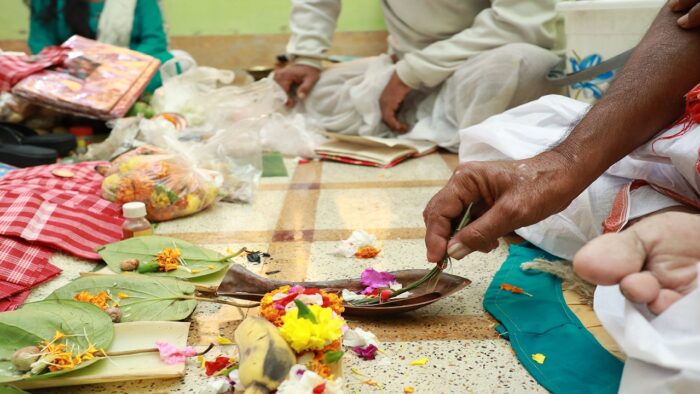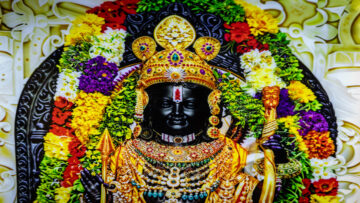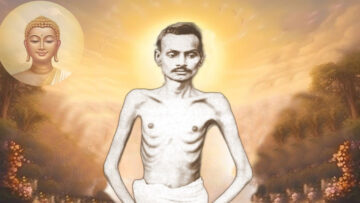Mahidhara Sastry was reluctant to leave Venugopalaswamy Temple soon after darshan (viewing the deity). He wanted to talk to the temple’s priest Valmiki Sarma. Valmiki Sarma is not an ordinary priest who knows the Agamas1. He is an extraordinary scholar of the Vedas2 and a Jatantaswadhyayi3. Listening to Valmiki Sarma reciting the vedas is a spiritual experience in itself. He makes you feel God’s presence around you.
“Is there a single brahmin vedic scholar like him?” – Mahidhara Sastry lamented. “Let alone vedic scholars, there are no brahmin priests anymore” – Sastry was distraught at this thought.
Mahidhara Sastry is an Indologist. He is currently conducting research on the temple priests, family priests and vedic scholars in India. Brahmins ruled over these professions in the past. Today, the situation is different, though.
Lord Venkateswara is the God for Kaliyuga4. Sudras5 and Dalits6 dominate temples and vedic studies now. Upper caste people are entering into worldly professions and migrating to first world nations.
It was heartening to see all those young students chanting vedic hymns rhythmically in the vedic schools. But Mahidhara Sastry was pained to note that there were no brahmin boys among them. He remembered his great grandfather who performed Somayagam7, and his grandfather, who was a well known vedic scholar and a devout man. This legacy was lost when his father immigrated to the United States. Mahidhara Sastry’s research in India is now supported by an American University’s funds. He met several scholars and priests as a part of this research, who are all non-brahmin.
1.
The priest Valmiki Sarma closed the temple doors and came out. Mahidhara Sastry bowed to his feet. Valmiki Sarma blessed Sastry and obliged him by chanting vedic hymns, as per his request. Sastry asked himself if Brahmins are capable of such a beautiful rendition. He wondered whether a tinge of folk voice added a new flavor to Sarma’s chants.
“Valmiki Sarma garu (honorific), you are blessed. The tradition of vedic education ended among the brahmins, thanks to Kali8. Taking up priesthood, or following the traditional religious rituals such as sandhyavandanam and nithyanushtanam9 have become extinct practices among them now. As per the vedic culture, “Janmana jayate sudrah, samskarat dwija uchchte” – everyone is born a sudra. They become a dvija or a brahmin through their actions. People like you are living proofs for this.”
Valmiki Sarma was happy, and attributed his success to his brahmin guru’s (teacher) blessings. “You made me forget that I have no brahmin students. You are reciting better than them.” – His guru once told him.
“Are there any brahmin priests or scholars left?” – Sastry asked.
“A friend, who passed away recently, was the last brahmin priest and scholar. We studied the vedas together. A few years ago, Brahmins dominated priesthood and vedic scholarship. We were a minority. Slowly, we turned into the majority. People from various castes became priests and scholars. Brahmins faded out of these professions” – Sarma replied. Sastry sighed.
“A relative performed Somayagam recently. I was the shrouti10 and conducted the rituals myself” – Valmiki Sarma said again.
“Did you perform animal sacrifice?” – Sastry asked, as the memory of a similar event his grandfather conducted flashed.
“No, we don’t allow animal sacrifice like the brahmins. We make an animal with flour for use in the fire rituals. We are completely vegetarian, unlike the brahmins from Bengal. We converted to vegetarianism after taking up vedic education and priesthood. My guru said – “Eating meat thickens the tongue and affects your chant.” – We follow his advice. Valmiki Sarma’s vocabulary and pronunciation seemed more precise than a brahmin priest now.
“If everyone abandons meat and turns vegetarian, there won’t be any violence at all” – Valmiki Sarma continued.
“That may create food supply problems” – Sastry replied.
“This is the problem with you brahmins. You don’t think about dharma11. Is it fair to kill voiceless animals to fill our own stomachs? I preach this every day in the temple, but the devotees think I say so because I am a priest. They excuse themselves saying that they are ordinary mortals. But that is not true. Did my ancestors know how to study the vedas or how to perform all these religious rituals? They were hunters. One of my ancestors, Sage Valmiki, wrote Ramayana out of the grief of seeing the separation of a bird couple.”
“Isn’t there a theory that Valmiki is a brahmin?” Sastry interjected.
“That is a made up story. He is our ancestor. That is why I am able to appreciate all this vedic education. What other proof do you need?” – Sarma asked back.
“We are the real protectors of Hindu religion now” – Sarma declared again, adjusting his sacred thread12. Mahidhara Sastry agreed, and acknowledged Sarma.
“I am thankful for the upper castes. They flourish in various worldly professions and do business all over the world, and fund our temples and vedic schools from their earnings. They are the reason for the survival of Hindu religion.”
2.
Valmiki Sarma was heading to some meeting. Mahidhara Sastry joined him to continue their discussion.
“I ask all these priests and scholars – ‘who are you?’ Today, you chant vedic hymns and ring the temple bells. But you were traditionally farmers and artisans. You grew crops, did skilled labor, and generated revenue for the nation. Now, you are into priesthood and scholarship. You know how to work hard. You also know that work is worship. For a long time, as you worked hard, others reaped the benefits. Now, you are on the other side of the fence. One has to agree that you got a break from the generations of hard work and toil.
Yet, you don’t seem to see the evil plan in making you priests. They drove you to the feet of God as the last option. You were called ‘God’s people’ and… “
“Stop this nonsense” – Valmiki Sarma shouted. “What is bad about those upper caste folks letting us into their sanctuary with an open heart? They once threatened to pour lead into our ears if we hear a vedic chant. But they now let us into this profession, and moved out of it. What is the conspiracy here? When everyone bowed at their feet in the past, our intellectuals caused an uproar saying that is unfair. “What is so special about their feet that is not present in ours?” – They asked. Now, everyone, including those upper castes, bow to us. Think about how far we have come. Our social status increased and our self-respect improved. We aren’t doing any menial tasks, and we stopped eating meat. We are more brahmin than brahmins themselves” – he went on, in full flow.
The speaker responded – “Anger won’t get us anywhere. Think about it. Reciting those incomprehensible vedic hymns all day seem to have taken away all your ability to reason. They rubbed their poverty on you in the name of priesthood, and flew away to foreign countries. You seem to think of a priest as a CEO of some company. It is akin to the life of a beggar. You don’t produce anything. So, you depend on others your entire life. You have to beg for livelihood and rely on others’ kindness. When they leave money in your plate, their hand is above yours. Shaking hands indicates mutual respect. Falling on one’s feet is a feudal, upper caste tradition and should be condemned. This is why they went into a civilized western culture. They roam around in self-driving cars and use robots for menial tasks. We are still living this life of congestion. While we rot in these low quality cars and perpetually wait for the drivers, they are reaping dollars with all that automation.”
“We are happily living on our own land, practicing our own religion. They left all their rituals and traditions and we grabbed that wealth” – Sarma interrupted the lecture.
“What is this ‘wealth?”
“Spiritual wealth” – Sarma replied. The speaker responded with a mocking laugh.
“They say that Sage Viswamitra became a Brahmin after a big penance. Even such a penance can’t convert a rupee into a dollar. A priest cannot become a CEO. Stop living in these dreams and think about how to race forward into the future. This is the purpose of today’s meeting” – the speaker added.
***
3.
Valmiki Sarma was shocked when he learnt about his son’s decision to not pursue vedic education anymore.
“What is wrong with you? Aren’t you worried about safeguarding our religion and traditions?”
“I don’t want to hear about all this. Further, it is also difficult to get married for one in this profession.”
“Am I not married? Stop saying nonsense”.
“Times are different now, nanna (daddy). World is changing. The women among us are also well educated now. It is not a good time to call myself the son of a priest. Why do you want to pull me into this quicksand? I don’t want to be a priest. I will get western education, go to the states, and work there.”
“Shut up. Do you think you are a brahmin?”
“Yes, I want to be a brahmin. I won’t get anywhere by performing these prayers and blessing the devotees who visit the temple all day. I should learn English and migrate to foreign countries. That is being a real brahmin. Everyone wants to be a brahmin now and are trying hard for that. Only we are left like priests. We are god’s servants, not gods on earth.”
“You fool – what do you think we should be doing?” – Valmiki asked.
“We should discard what brahmins discarded and look for what they looked for. In short, I should not follow you into this profession.”
There are other issues that are bothering Valmiki Sarma, apart from his son’s refusal to take up his profession. “Did he make the right decision by taking up this profession?”- he has been thinking about this for a while now. In the first days of this profession, he wondered if he is eligible to enter a temple, and whether it is fair to take up the profession of a brahmin and follow their traditions. It was perhaps not what God had destined for him.
In those days, there were still some brahmin priests left. Slowly, brahmin priests and scholars became extinct and these questions stopped bothering him. Now, if people like him quit this profession, there is no one to take care of the temples and the gods inside them. All the temples in the country will turn into ruins in no time. The shudras and dalits have now become the last protectors of the God who is uncared for.
But some intellectuals argue that these Sanskrit hymns and these rituals are not ours, and we became the scapegoats in this evolution. Our traditions were all very different from these brahmin traditions, and now, they are all extinct. There is no diversity in life. This is no different from losing our biodiversity.
Should Valmiki be happy that he stepped into an area once prohibited for his people, and is reciting the hymns that they couldn’t even hear once? At a place where even an entry is prohibited, he is now able to spend time directly in front of God everyday. Should he be happy about this, or feel sad that he lost his original identity in this process?
Mahidhara Sastry, who belongs to a traditional brahmin family, bowed in front of him today. Is this a matter of happiness and pride?
In the days when there was no such respect, he did not have a veneer of brahmanism. Now, all his actions and lifestyle seem to bear the weight of brahmanism.
Sometimes, his mouth waters when he smells the aroma of cooking meat. But now, he is the chief priest of the famous Venugopala Swamy temple, and a renowned scholar. Even brahmins bow in front of him. He is like an entry point to God’s presence. He has to be more in control of his senses.
His ancestors drank liquor, ate meat and danced to the drum beat in the village fairs. This seems impossible now.
Some people from his caste become Christian pastors. He became a Hindu priest. Both result in severing ties with one’s past. This severance is the burning question that has been bothering Sarma. Can he leave his past as an offering to the fire in these rituals? Can he burn all his traditions and his legacy in the ritual fire? It is impossible. Perhaps all those brahmins who left their legacy have the same questions. Mahidhara Sastry’s research is perhaps a way of expressing these internal thoughts. It is perhaps an effort to fill a void. Who knows?
But, nowadays, there is one religion all over. People seem to be harmonious. Vedic chants are heard everywhere. Everyone is able to read the Sanskrit prayers. Only brahmins seem to have forgotten these things, although brahminism rules everywhere. The Sanskrit hymns penetrated even into the festivals typically performed by other castes. This sort of religious unity never existed in the past. Valmiki Sarma felt pride in playing a major role in this transformation. But what happened to his own identity? There were tears in his eyes.
Suddenly, someone came running towards him. He couldn’t identify the person in the darkness.
“Ayya! (honorific) Mahidhara Sastry drowned in the temple pond. He is no more.”
“How did it happen?” – Sarma was shocked.
“No idea, ayya. Some people say he slipped and fell while absent mindedly walking along the pond. Some say it is a suicide.”
***************
General Notes:
Original title: పూజారి 2040/Poojaari 2040
Original Author: Rani Sivasankara Sarma
About the author: Rani Sivasankara Sarma is a Telugu writer, known for his novel “The Last Brahmin”, which was translated into English as “The Last Brahmin: Life and Reflections of a Modern-day Sanskrit Pandit”. His other works in Telugu include “Grahantaravasi”, “Purana Vedam” and “Americanism”. His most recent work is titled Sakuntala, a work of fiction inspired by Kalidasa’s Abhignana Sakuntalam.
Translator’s note: The original Telugu short story appeared in “Andhra Pradesh” monthly (February 2018 issue). The story imagines a scenario where the profession of priesthood, which is generally taken up by brahmins, is dominated by non-brahmin castes in a future time period. I liked the premise of the story, and hence, chose to translate it into English as I don’t know of any other story that touches upon this theme in Telugu or English, the languages I read in.
***************
Glossary:
- Agamas are a collection of Hindu religious texts, which describe the traditions and procedures for temple-building, consecration and ritual worship.
- Vedas are a body of religious texts, considered the oldest scriptures of Hinduism.
- Jatantaswadhyayi: a vedic scholar who is an expert at reciting thousands of vedic hymns without making mistakes, without referring to anything.
- Kaliyuga is the fourth (and considered the worst) of the cycle of four ages of time in Hinduism.
- Sudras: one of the groups in the four category Hindu varna system.
- Dalits is the name given for people belonging to castes that are considered outside of the four-fold varna system.
- Somayagam is a Hindu ritual done in front of a sacred fire.
- Kali is the reigning lord of Kali Yuga according to Hindu tradition.
- Sandhyavandanam and Nityanushtanam are daily rituals prescribed for some communities in Hinduism.
- Shrouti is a vedic scholar who is well versed with the rituals associated with some vedic ceremonies such as a yagna, and ensures that everything is conducted correctly.
- Dharma can be described as a set of religious principles governing one’s conduct, in Hinduism.
- Sacred Thread refers to the thread worn across the torso by a male in some Hindu communities including brahmins.
Featured Image Credit: istockphoto.com
Disclaimer: The opinions expressed in this article belong to the author. Indic Today is neither responsible nor liable for the accuracy, completeness, suitability, or validity of any information in the article.






